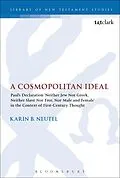What did Paul mean when he declared that there is 'neither Jew nor Greek, neither slave nor free, nor male and female' (Galatians 3:28)? While many modern readers understand these words as a statement about human equality, this study shows that it in fact reflects ancient ideas about an ideal or utopian community. With this declaration, Paul contributed to the cultural conversation of his time about such a community. The three pairs that Paul brings together in this formula all played a role in first-century conceptions of what an ideal world would look like. Such conceptions were influenced by cosmopolitanism; the philosophical idea prevalent at the time, that all people were fundamentally connected and could all live in a unified society. Understanding Paul's thought in the context of these contemporary ideals helps to clarify his attitude towards each of the three pairs in his letters. Like other ancient utopian thinkers, Paul imagined the ideal community to be based on mutual dependence and egalitarian relationships.
Autorentext
Karin B. Neutel is a Postdoctoral Researcher at the University of Oslo, Norway. Her current research focuses on ancient and contemporary attitudes towards male circumcision.
Inhalt
Introduction
Part 1. One in Christ: The Reality of an Ideal Community
Part 2. Neither Jew nor Greek: Eschatological Gentiles and Jewish Cosmopolitanism
Part 3 Neither Slave nor Free: Brothers in the Lord
Part 4. Nor Male and Female: Marriage at the End of the World
Conclusion
Bibliography
Conclusion
